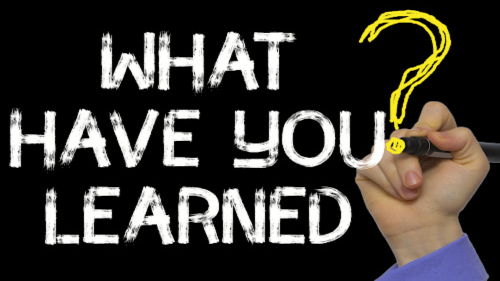How to Respond to Disrespectful Students With Care
What do you expect of your students, as to an expectation of respect for you and your position as their instructor?
From my experience, whenever you teach a class with adult students, there is an expectation these students will maintain a basic level of respect for you as their instructor. It’s a mutual process, with the instructor reciprocating back to their students that same basic level of respect. I’ve not had to think about this topic until recently, when I’ve observed a trend with many online students no longer holding respect for their instructors.
What I’m noticing is some online students feeling empowered to speak in any manner they see fit, without regard for the school’s Student Code of Conduct. Worse yet, a student who speaks with a lack of respect can also become a class disruptor, and before long, their attitude begins to show up among others in the class. We are all humans, and when you are trying to teach from a perspective of care and concern, or true appreciation for your students, it can feel unpleasant when a student is being negative and aggressive.
If this is happening to you, especially within your online classes, there are strategies I recommend you consider using. While it may not be possible to stem the tide of what is happening from a larger or societal perspective, perhaps what I recommend will help you to find a way of allowing you to continue to demonstrate appreciation for your students. Since disrespect is a negative disposition that can spread throughout the class, a set of proactive strategies is needed to address it head-on. This will help avoid reactively responding in an emotional manner.
How Disrespect Infects an Entire Class
Throughout my career teaching online classes, I’ve had an occasional student demonstrate disrespect, and it typically was a one-time incident. For example, it may have been related to a grade a student believed was unfair or unjustified, and the student sent a message using inappropriate words. However, I’m noticing something more than just an occasional message, I’m observing the rise of a class disruptor. This is a student who takes their disagreement to an entirely new level.
A student as disruptor may form a group outside of the class for other students to join, and then share their negativity with the group. It isn’t long until I’m noticing a similar disrespectful attitude from other students in the class. In other words, this disruptor spreads negativity and it catches on like wildfire. I’m not talking about a general negative attitude either. These are outright acts of disrespect, from challenging statements made on a discussion board, to disrespectful messages sent directly to me.

An Issue of Generational Differences
I’ve been teaching online for over 18 years, and back when I began, it seemed as if students held a different attitude towards their instructors. I was also an online student at the time I began teaching in this environment. It was the early 2000s, and it seemed as if there was an automatic level of respect given by students, not only for the work they were producing in class, but also for their instructors. When I was enrolled in my doctoral program, I witnessed the highest level of respect given by students, including myself, towards instructors and the work being developed and submitted.
I was raised in a generation that valued hard work and absolute respect for those in authority. The fact my father was a police officer also influenced my outlook and work ethic. I would never think of being disrespectful to anyone. This may also be a quality of a Baby Boomer, which is the category I belong in. I’ve read a number of research studies that point to certain newer generations as having an attitude of entitlement, or being difficult to work with in general, yet I find it hard to imagine how respect would not be a fundamental aspect of a person’s make-up or set of characteristics. But I’ve observed it does at times, and that is why it must be addressed as an online teaching strategy or set of strategies.
Strategies to Help You Respond to Disrespectful Students
There are some forms of disrespect which you must address quickly and with procedures established by your school. However, the type of disrespect the following strategies are designed for involve the ongoing challenges that make it difficult for you to remain positive. For example, I had a student who sent messages with an abrasive tone, simply because they received two points deducted from their assignment. It wasn’t easy at times, yet I did my best to continue to show this student I cared about them and appreciated their efforts. Perhaps these strategies will help you as well.
Strategy 1: Adjust Your Mindset for Appreciation
Whenever I have a student who uses abrasive language, or an improper tone, I first have to determine if it has crossed a line and must be reported. If not, I then have to center myself and use my own emotional intelligence skills to monitor how I’m feeling. I have to make certain my mindset is well-adjusted before I respond. I had to stop, breathe, and remind myself of my core beliefs, which is to help students learn and grow. To do this, I must always be appreciative of their efforts, regardless of how they behave in class. I want to address their performance, not behaviors.
Strategy 2: Appreciation Comes from the Inside Out
I am someone who can tolerate a lot from students, and over the course of 18+ years I have tolerated a lot of strong wording from students. Yet this new form of student as disruptor, and someone who comes right up to the line of what is not acceptable, is really quite stressful. In fact, I find when many in a class begin to act like this, it can feel overwhelming at times. I have to really be aware of how I am feeling and if I become too personally affected by the stress of the class, I need to provide myself with some downtime, even it is a matter of a few hours. That break away from the online class can help free my mind and give me a renewed perspective. I can then go back to feeling appreciation for my students, knowing it comes from the inside out.

Strategy 3: Remember to Appreciate and Respect Your Role
Now this may seem to be counterintuitive for demonstrating appreciation; however, this strategy is about showing appreciation for your work and care for your position. If you have a disrespectful student, or more than one, be certain your communication is done through proper channels. For example, if you are expected to communicate through the classroom messaging system, do so to make certain there is a record.
If a student would like a phone call with you, and this has been an ongoing problematic student, then offer something such as Zoom, so you can record the conversation. You may not need the documentation; however, it is better to have it than be put in a situation where words are disputed. This strategy is not meant to inhibit how you work with your students, but rather ensure you have properly worked with them. Appreciation is necessary for you and your students.
Strategy 4: Establish Expectations and Show Appreciation When Met
Remember you can always tolerate students and their behavior, but communicate your expectations. The Course Syllabus typically has a statement about the Student Code of Conduct, which you can refer to when or if needed. I know many instructors like to remain popular and more importantly, they are afraid to make their students mad, simply because of the potential for negative end-of-course evaluation scores and commentary.
Yet you have to remember that disrespect will likely escalate if you do not address it. What I recommend is you establish your expectations at the start of the class, and show appreciation to students when they have met them. Any time you can demonstrate appreciation for something students have done, be it a milestone, goal, or adherence to what you expect, it helps build positive emotional feelings within them.
Strategy 5: Evaluate Situations to Demonstrate Care and Concern
There is always something to be learned after you have addressed a student who has demonstrated disrespect. For example, what was at the heart of the student’s frustration or cause for concern? From my perspective, most instances occur because of grades and points not earned.
What I have learned over time is the importance of weekly instructional videos, conducting webinars, providing video feedback, and reviewing the grading rubrics included with the learning activities. In other words, I’ll try to proactively address the areas which are most likely to cause upset for students. My goal is to demonstrate care and concern for the entire class, and offer guidance to help them succeed.

Remember: You are Human
Any time you experience disrespect it can feel personal, as it seems like an attack, on you, your credibility, authority, subject matter expertise, and/or professional experience. What I want for you to remember is that you are human. If you find yourself in a situation in which you feel a sense of ugliness or mean spiritedness, take a break. Walk away from the laptop or computer, and find a space to regroup. Perhaps you can walk outside, speak with a family member, call a colleague, or do anything but go back into that environment. You need to do something that will distract you long enough to let your emotions settle down. Then your rational mind can begin to help address your feelings, and you can develop a plan for what to do next. What you don’t want to do is react in anger or while you are feeling negative. Show your students you appreciate them no matter what they have done, and care for them during the best and worst of times. As a result, you’ll feel good about yourself, and the work you dedicate so much time and effort to complete.
About Dr. Johnson
Dr. Bruce A. Johnson has 35 years of experience teaching and training adults. The first half of his career was spent in the field of Corporate Training and Development, with his last role as Manager of Training and Development.
Then in 2005, he made a transition into the field of distance learning. Over the past 18 years, he has been an online instructor, Faculty Development Specialist, Faculty Director, Faculty Development Manager, and Dissertation Chair.
Dr. Johnson is also an inspirational author, writer, and educator. His life mission is to teach, mentor, write, and inspire others. He has earned a PhD in Postsecondary and Adult Education, a Certificate in Training and Performance Improvement (TPI), a Master’s in Adult Education, and a Master of Business Administration (MBA).
As a scholar practitioner, Dr. J was published in a scholarly journal, and he has been a featured presenter at an international distance learning conference, along with presenting at three faculty conferences. He has also published over 230 online articles about adult learning, higher education, distance learning, online teaching, and mindset development. Dr. J published three books related to higher education, including two about online teaching.
Getting Down to Business: A Handbook for Faculty Who Teach Business.
Transform Adult Education: Expert Teaching Strategies for Educators.
Transform Online Teaching: Expert Strategies and Essential Resources Every Educator Needs.
Come join Dr. J’s new group, Motivation for Transformation:
• Any time of the day, visit this group to find your source of motivation, to be inspired and more importantly, have your mindset transformed: Motivation for Transformation
Dr. J offers transformative resources
Please visit the Books page and Store page for more details.
You can also find Dr. J on the following social media sites:



